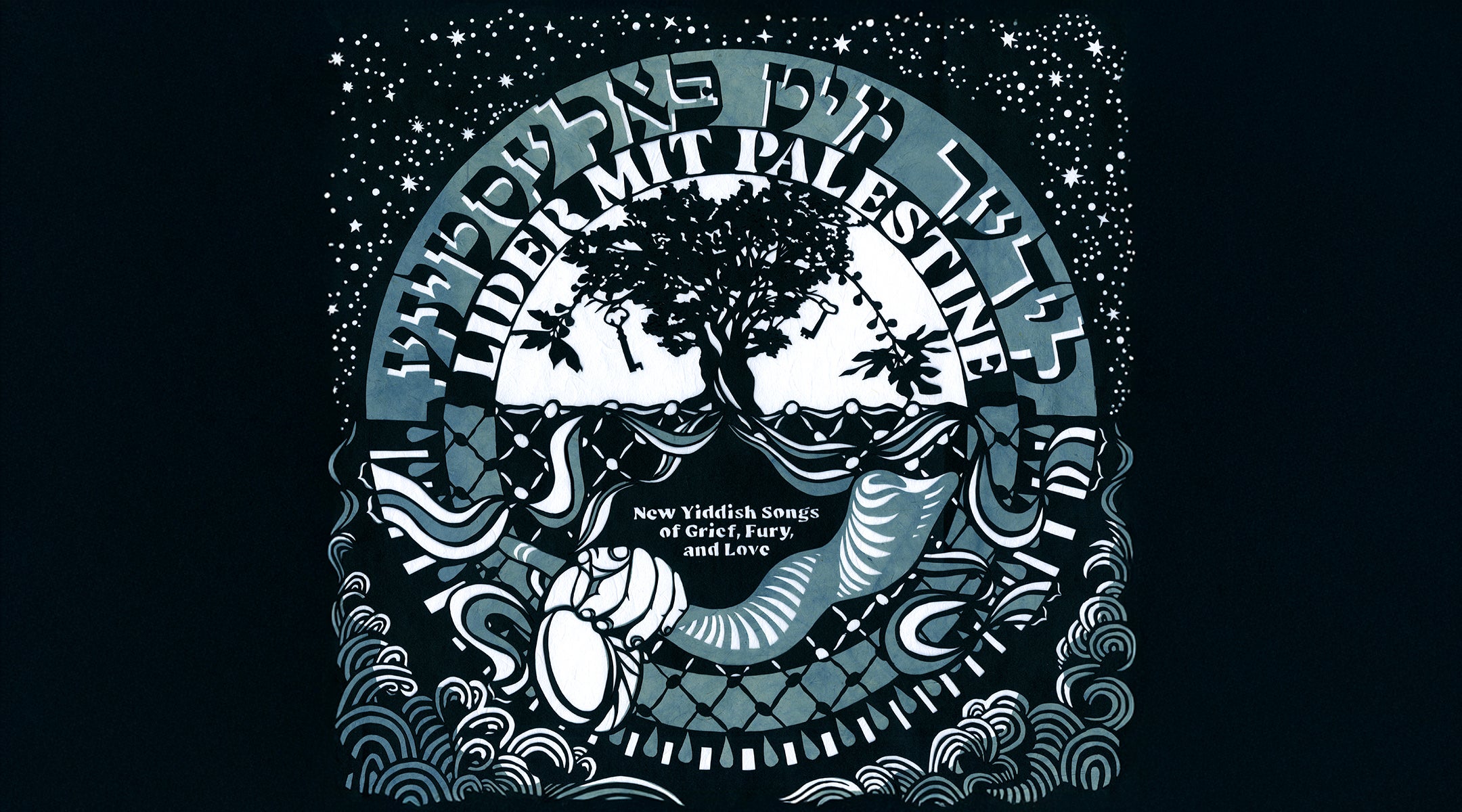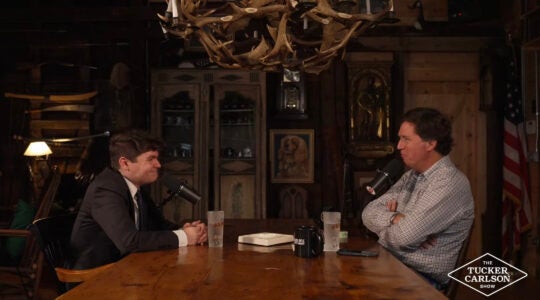Yiddish is the language of the Jews of Eastern Europe and all the places to which they spread.
It is the language of socialists and capitalists, the Partisans who fought the Nazis and most of the millions who were killed in the Holocaust. It is the everyday tongue of tens of thousands of haredi Orthodox Jews and a “post-vernacular” language nurtured in academic programs, cultural festivals and a small but active community of Yiddishist speakers, writers, translators and musicians.
In its latest incarnation, it is also the language of 17 songs of solidarity with the Palestinians and anger at the Israeli war in Gaza. “Lider mit Palestine: New Yiddish Songs of Grief, Fury, and Love” draws on the history of the language — including a rich legacy of progressive protest songs — in ways validating to Jews who share the contributors’ leftist politics and no doubt infuriating to Jews who don’t.
Produced by Joe Dobkin, Josh Waletzky and Isabel Frey, “Lider mit Palestine” arrives as criticism of the war has been intensifying, especially amid a hunger crisis in Gaza and accusations, which Israel fiercely denies, that its government is directing a genocide.
The songs take up that criticism, and then some: In dirges, prayers and folk songs by an array of musicians, Israel is referred to as an “evildoer” (roshe) and “oppressor” (badriker); counting the producers’ and artists’ statements and the lyrics themselves, “genocide” is mentioned over a dozen times. (The Hebrew word “khurban,” which can be used in Yiddish to mean genocide in general and the Holocaust in particular, originally described the destruction of the First and Second Temples,.) The album has no laments for the Israeli hostages, and no explicit reference to the Hamas attacks of Oct. 7, 2023 that initiated the war.
“What all of the songs have in common is that they’re speaking out,” said Dobkin, in a Zoom interview with his co-producers. “The unifying thing is a need to not just be silent and tacitly accept what’s happening.”
The producers are all well-known figures in the global secular Yiddishist community: Dobkin, 42, is a Brooklyn-based audio producer and poet, and Frey, 30, is a singer and ethnomusicologist who writes and records Yiddish protest songs in her native Vienna.
Waletzky, 77, is a prolific composer of new Yiddish song; “Lider mit Palestine” grew in part out of a songwriting workshop he co-led at the Yiddish New York festival in December 2023.
“That was just a few months into the Israeli military action against Gaza, and there was an outpouring of Yiddish songs newly written,” he recalled. “It was a very emotional workshop, because the songs were treating what was happening every day in the news. It had a tremendous effect on everyone.”
Among the songs being workshopped that day was Dobkin’s composition,”Falndike vent” (Falling Walls), which references his grandparents’ suffering in the concentration camps to conclude that “that wound must not be turned into a weapon.”
“Because of my proximity, in terms of my grandparents having survived the camps and their families having been killed, it felt like something that I wanted to communicate,” he said. “Writing and singing in Yiddish was just the natural way to do it.”
The last line of the song invokes one of the most controversial slogans of the pro-Palestinian movement: “No one is free,” Dobkin sings in Yiddish, “until all are liberated between every sea and river.”
Many Jews and supporters of Israel regard the phrase “Palestine will be free, from the river to the sea” as a call for the elimination of a Jewish state between the Mediterranean and the Jordan River, and even a goad to genocide. “I am emphatically not interested in provocation for the sake of provocation. I chose to include that phrase because I see it as being misrepresented,” Dobkin said. “It’s important for me to say, as a Jew in a Yiddish song, that freedom for Palestinians is not a threat to Jews.”
\What can be dizzying about the collection is the way traditional themes of Yiddish song and Hebrew liturgy — lyrics of resilience in the face of persecution, prayers of consolation for the brokenhearted, Lamentations read on Tisha B’Av — are recast with the Palestinians as their protagonists. Dobkin said his song was inspired in part by a video of an Israeli soldier who sang “Zog nit keyn mol,” an anthem of the Jewish Partisans, from the turret of a tank presumably headed to Gaza.
“The message we were supposed to get from that was that this military operation was for the sake of Jewish survival,” said Dobkin. “And my instinctual response was that it’s not.”
Frey offers a dizzying reversal of her own, using the melody of Israel’s national anthem, “Hatikvah,” to condemn “Jewish ethno-nationalism.” “We don’t need armies, / We don’t want a state,” she sings in what she calls a “parody” of the anthem. “Our strength doesn’t come from artillery.”
Frey said the song is a reaction to her own upbringing, when she belonged to a Labor Zionist youth group that presented an uncritical picture of Israel. Having become disillusioned after a visit to the West Bank, she gravitated toward a form of “diasporism,” which seeks to elevate the culture Jews created outside of the Land of Israel. She identifies with the Bund, the Yiddish socialist organization that opposed Zionism before the founding of the state and is committed to Jewish life and culture in the diaspora.
Leftists like her also see Yiddish itself as an ideological mainstay of Jewish movements that opposed Zionism, even as Israel embraced modern Hebrew.
“That was something that brought me to Yiddish, because I didn’t have a background with Yiddish,” she said. “What attracted me was this left-wing Jewish history of anti-assimilationist politics.”
The album reflects a small but increasingly apparent divide among Yiddishists, and the Jewish public in general, that often plays out in generational terms. Yiddish cultural institutions in the United States have faced tension over the Israel-Hamas war, after younger students and employees, anti-Zionist or just deeply critical of Israel, demanded that the groups’ Zionist older guard weigh in against the war.
Yiddishists are not of one mind on the war in Gaza. At last year’s KlezCanada, a summer retreat for the North American Yiddish community, amid the Yiddish classes and musical performances, organizers held a series of four “Community Conversations” to help attendees air “the diverse ways we have been connected to and impacted by the war in Israel and Gaza.”
On Reddit, a user in the r/Yiddish group objected that the album was released in the three-week stretch ahead of Tisha B’Av, a period of communal Jewish mourning. “During the 3 weeks?” they wrote. “That is so culturally insensitive.”
But Frey, Waletzky and Dobkin said it is vital that the “grief, fury and love” of the album’s subtitle be expressed in a Jewish vernacular.
Waletzky says love inspired his song “A shtik fun harts” (A Piece of My Heart), which is about a childhood friend who grew up to be an uncritical Zionist. “It’s about the love of someone that you’ve grown up with, knew from childhood, who has taken a different path, a path of supporting what Israel is doing,” he said. “And that’s a heartbreaking moment in anyone’s life.”
For Dobkin, the album’s subtitle reflects a “love of humanity that explicitly includes the humanity of Palestinians, and a love of Jewishness and of the Jewish family that I hope would be self-evident.”
Dobkin said proceeds from downloads and sales of the CD would go toward cultural initiatives in Gaza, to be used, depending on conditions on the ground, for arts education and programming or to buy food.
(Editor’s note: Due to a transcription error, a previous version of this article misrepresented a quote by Joe Dobkin. He did not say, “For the sake of provocation, I chose to include that phrase because I see it as being misrepresented.” What he did say was ““I am emphatically not interested in provocation for the sake of provocation. I chose to include that phrase because I see it as being misrepresented,” he said. The text has been corrected. JTA regrets the error.)
JTA has documented Jewish history in real-time for over a century. Keep our journalism strong by joining us in supporting independent, award-winning reporting.






